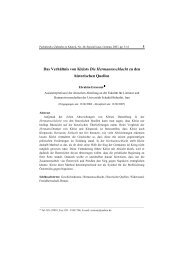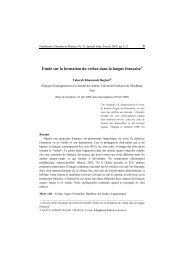Phonological Metathesis in Persian: Synchronic, Diachronic, and the ...
Phonological Metathesis in Persian: Synchronic, Diachronic, and the ...
Phonological Metathesis in Persian: Synchronic, Diachronic, and the ...
Create successful ePaper yourself
Turn your PDF publications into a flip-book with our unique Google optimized e-Paper software.
40 Pazhuhesh-e Zabanha-ye Khareji, No. 56, Spr<strong>in</strong>g 2010<br />
<strong>the</strong>y have accumulated over years. These successful experiences contribute to<br />
streng<strong>the</strong>n<strong>in</strong>g <strong>the</strong> teachers’ sense of efficacy <strong>in</strong> a cyclical nature, <strong>in</strong> that, when <strong>the</strong>y<br />
succeed <strong>in</strong> accomplish<strong>in</strong>g a task, <strong>the</strong>y ga<strong>in</strong> greater efficacy which leads to greater<br />
efforts <strong>and</strong> persistence. This, <strong>in</strong> turn, results <strong>in</strong> teachers’ improved performance<br />
which boosts efficacy (Tschannen-Moran & Hoy, 1998). Therefore, s<strong>in</strong>ce mastery<br />
experience is <strong>the</strong> most powerful source of efficacy, it enhances experienced<br />
teachers’ self-efficacy beliefs to a larger extent <strong>in</strong> comparison with verbal<br />
persuasion which is heavily utilized by novice teachers.<br />
The only discrepancy between <strong>the</strong> present study <strong>and</strong> those conducted by<br />
Tschannen-Moran <strong>and</strong> Hoy (2002, 2007) is that while <strong>the</strong>y did not f<strong>in</strong>d any significant<br />
difference between novice <strong>and</strong> experienced teachers’ efficacy for student engagement,<br />
<strong>the</strong> present research demonstrated that experienced English teachers feel more<br />
efficacious for <strong>in</strong>volv<strong>in</strong>g students <strong>in</strong> class activities. This might be attributed to <strong>the</strong><br />
difference between <strong>the</strong> participants <strong>in</strong> Tschannen-Moran <strong>and</strong> Hoy’s (2002, 2007) study<br />
<strong>and</strong> those <strong>in</strong> <strong>the</strong> present one which was just concerned with English teachers (as<br />
opposed to <strong>the</strong> former ones that chose teachers from different subject matters). Perhaps<br />
one of <strong>the</strong> major differences between teachers of o<strong>the</strong>r discipl<strong>in</strong>es <strong>and</strong> language teachers<br />
perta<strong>in</strong>s to <strong>the</strong> importance <strong>the</strong> latter group attaches to elicit<strong>in</strong>g students’ engagement <strong>in</strong><br />
classroom activities. The value of student engagement <strong>in</strong> language classroom has been<br />
echoed by recent <strong>the</strong>ories of language teach<strong>in</strong>g such as communicative language<br />
teach<strong>in</strong>g (Savignon, 1991), tasked-based language teach<strong>in</strong>g (Skehan, 1998), <strong>and</strong><br />
sociocultural <strong>the</strong>ory of learn<strong>in</strong>g (Ellis, 2003). Therefore, a general characteristic of an<br />
English teacher, which dist<strong>in</strong>guishes him/her from teachers of o<strong>the</strong>r subject matters, is<br />
his/her ability to engage students <strong>in</strong> perform<strong>in</strong>g classroom tasks. More precisely, one of<br />
<strong>the</strong> crucial factors which makes English teachers judge <strong>the</strong>mselves as qualified persons<br />
is <strong>the</strong>ir belief <strong>in</strong> <strong>the</strong>ir ability to elicit students’ participation <strong>in</strong> <strong>the</strong> classroom activities.<br />
As a result, this subcomponent of efficacy (i.e., efficacy for student engagement) is a<br />
dist<strong>in</strong>guish<strong>in</strong>g parameter between novice <strong>and</strong> experienced teachers.<br />
Ano<strong>the</strong>r reason for lower levels of efficacy among <strong>in</strong>experienced teachers is that<br />
while experienced teachers utilize <strong>the</strong>ir accomplishments to enhance <strong>the</strong>ir sense of






